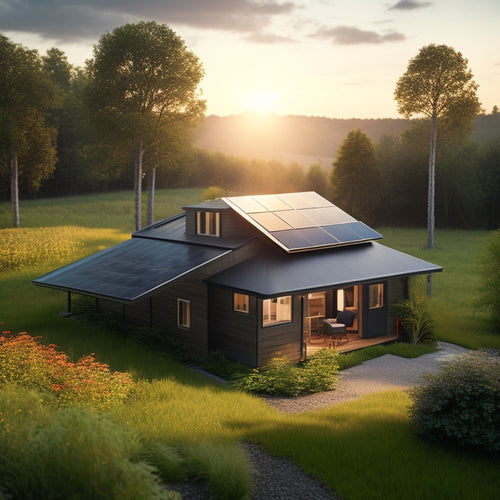
Off Grid Home Solar System Kit
Share
With an off-grid home solar system kit, you can utilize the power of the sun to energize your home, cutting ties with traditional grid-based energy and its unpredictable costs. By accurately evaluating your daily energy needs, you can size your system correctly and maximize energy independence. A high-efficiency solar panel inverter will guarantee you get the most out of your system, while proper battery management and maintenance will extend its lifespan. By taking control of your energy needs, you'll enjoy financial benefits and a reduced carbon footprint - and that's just the beginning of your path to sustainable living.
The Essentials
- Off-grid solar system kits provide independence from traditional grid-based energy, offering protection from utility rate hikes and outages.
- Accurate assessment of daily energy requirements is crucial for sizing off-grid solar system kits, ensuring sufficient power for appliances and devices.
- High-efficiency solar panel inverters, such as 98% efficient models, maximize solar power output and support energy independence.
- DIY off-grid solar systems enable unlimited clean energy access, and self-sufficiency strategies assess energy needs and conservation methods.
- Battery management and maintenance, including proper charge cycles and regular maintenance, are essential for extending the lifespan of batteries in solar systems.
Energy Independence at Home
You're taking control of your energy needs with renewable energy sources, ensuring a sustainable future for your home.
By utilizing the power of solar energy, you're free to power your lifestyle without relying on the grid.
With an off-grid solar power system, you can break free from the constraints of traditional grid-based energy and achieve energy independence.
This means you can live life on your own terms, unaffected by utility rate hikes or outages.
Renewable Energy Sources
Renewable energy sources are becoming increasingly vital for homeowners seeking energy independence. As you consider breaking free from the grid, you'll want to investigate the various options available.
Geothermal energy, for instance, utilizes the Earth's natural heat to provide warmth and hot water. Wind power, another viable option, converts wind kinetic energy into electricity. Biomass energy, which involves burning organic matter, can also be an effective way to generate power.
If you have access to a water source, hydroelectric systems can provide a reliable and renewable energy supply. For a reliable power supply, it's essential to pair these sources with high-performance Deep Cycle Power Storage Options to maximize energy storage and minimize maintenance.
In addition to these options, solar thermal systems can be used to heat water and provide space heating. Energy storage solutions, such as batteries, are also essential for storing excess energy generated by these systems.
By adopting these sustainable practices, you'll notably reduce your carbon footprint and contribute to energy conservation. Additionally, smart grids can help you manage your energy distribution efficiently, ensuring that you're maximizing your energy independence.
Powering Your Lifestyle
As you investigate the various renewable energy sources, it's time to contemplate how to power your lifestyle and achieve energy independence at home.
You're not just looking to reduce your reliance on the grid; you're seeking a sustainable living approach that aligns with your values. By adopting eco-friendly practices, you'll not only minimize your carbon footprint but also save on energy costs.
With the use of DIY off-grid solar systems, homeowners can break free from the constraints of traditional energy sources and enjoy unlimited clean energy Renewable Energy Solutions.
Furthermore, embracing an off-grid lifestyle can be incredibly fulfilling, providing a sense of independence and self-sufficiency.
To achieve this, you'll need to assess your energy requirements and develop self-sufficiency strategies. This involves evaluating your energy usage patterns, identifying areas for energy conservation, and exploring green energy solutions.
Renewable technology, such as solar power, can provide a reliable source of energy, reducing your dependence on fossil fuels and mitigating environmental benefits.
Zero Electricity Bills Guaranteed
With an off-grid home solar system kit, you're about to experience a significant shift in your energy expenses.
You'll be generating your own clean energy, which means zero energy costs ahead, and you'll start saving money on power bills from day one.
By utilizing the power of the sun, you'll be completely eliminating your reliance on the grid, resulting in substantial long-term savings.
Our off-grid solar power systems are designed to provide energy independence anywhere, with complete renewable power solutions off-grid living systems and DIY solar power kits that make it easy to get started.
Zero Energy Costs Ahead
You're about to experience a revolutionary shift in your energy consumption - one that will leave you pocketing the cash you used to spend on electricity bills.
With your off grid home solar system kit, you'll be utilizing the power of the sun to generate electricity, reducing your reliance on the grid and slashing your energy costs.
Say goodbye to the uncertainty of monthly electricity bills and hello to a life of energy independence.
Your solar panel system will provide you with a consistent and reliable source of power, allowing you to live life on your own terms.
And with minimal solar panel maintenance required, you can rest assured that your system will continue to perform efficiently for years to come.
As you move to off grid living, you'll uncover the freedom and flexibility that comes with being your own energy provider.
No longer will you be tied to the grid, with its fluctuating prices and unpredictable outages.
Instead, you'll be in control, generating your own clean, renewable energy and living life on your own terms.
Save Money on Power
Solar-powered electricity generation slashes your energy expenditures, guaranteeing zero electricity bills and a hefty sum of savings in your pocket. With an off-grid home solar system kit, you'll enjoy significant financial incentives, including reduced energy costs and potential tax credits. This translates to more money in your pocket for budget planning and allocating resources to other essential areas of your life.
| Benefits | Description |
|---|---|
| Zero Electricity Bills | Say goodbye to hefty electricity bills and hello to a significant reduction in your energy expenditures. |
| Financial Incentives | Take advantage of tax credits and rebates offered by the government for adopting renewable energy solutions. |
| Increased Savings | Allocate the money you save on energy bills to other essential areas of your life, such as retirement planning or investments. |
| Improved Budget Planning | With predictable energy costs, you can create a more accurate and reliable budget for your household expenses. |
High-Efficiency Solar Panel Inverter
When selecting a high-efficiency solar panel inverter for your off-grid home solar system kit, you'll encounter different types, including string inverters, microinverters, and power optimizers.
Each type has its advantages and disadvantages, which you'll need to evaluate based on your system's specific requirements. For instance, having a reliable off grid solar system in place can guarantee continuous power during outages and nights.
You'll also want to reflect on energy storage solutions, such as deep cycle batteries, to complement your inverter choice.
You'll also need to assess inverter efficiency ratings, which typically range from 90% to 98%, to confirm you're getting the most out of your solar panel array.
Solar Panel Inverter Types
Since your off-grid home solar system kit relies on the inverter to convert DC power from the solar panels to AC power for your household, selecting the right inverter type is vital.
You'll want to evaluate the specific needs of your system and the benefits of each inverter type. String inverters are the most common, offering a cost-effective solution for small to medium-sized systems.
Micro inverters, on the other hand, provide more flexibility and monitoring capabilities, but at a higher cost. Hybrid inverters combine the benefits of string and micro inverters, allowing for both DC-coupled and AC-coupled systems.
Power optimizers can be used with string inverters to optimize energy production at the panel level. If you're looking to sell excess energy back to the grid, a grid tie inverter is the way to go.
Finally, battery inverters are designed for off-grid systems, enabling you to store excess energy in batteries for later use.
Inverter Efficiency Ratings
In a typical off-grid home solar system kit, the inverter's efficiency rating plays an essential role in determining the overall performance of the system. You want to verify that the inverter you choose can convert the maximum amount of DC power from your solar panels to usable AC power for your home.
When comparing inverter types, you'll notice that different models have varying efficiency ratings, usually ranging from 90% to over 98%. A high-efficiency inverter can greatly impact your system's overall performance.
For instance, if you have a 5 kW solar panel array and an inverter with a 95% efficiency rating, you can expect to lose around 250 watts of power due to inefficiencies. In contrast, a 98% efficient inverter would only lose around 100 watts.
This may not seem like a lot, but it can add up over time, especially for off-grid systems where every watt counts. When selecting an inverter, prioritize high-efficiency models to maximize your solar power output and achieve energy independence.
Assess Your Energy Requirements
You need to determine your daily energy usage to size your off-grid home solar system kit correctly. To do this, you'll conduct an energy needs evaluation, which involves calculating your total daily energy consumption in watt-hours (Wh).
This calculation will help you identify the required solar panel array size, battery bank capacity, and inverter rating for your system.
When designing an off-grid energy system, it's crucial to take into account the load requirements of your remote home or property, which may include home solar power systems and other appliances.
Daily Energy Usage
Determining your daily energy usage is an essential step in designing an off-grid home solar system kit that meets your power needs.
To accurately assess your energy consumption, you need to examine your daily habits and identify areas where you can optimize energy efficiency. Start by tracking your energy usage over a week or a month to get a clear representation of your consumption patterns.
Make a list of all your appliances, lighting, and devices, and note their respective power ratings. Calculate the total energy required to power each device and multiply it by the number of hours you use it daily. This will give you an idea of your total daily energy consumption.
Be sure to include energy-intensive appliances like refrigerators, air conditioners, and water pumps in your calculations.
Energy Needs Assessment
Accurate energy needs evaluation is essential to designing an off-grid home solar system kit that caters to your specific power requirements. You need to determine your energy consumption trends and household power habits to verify your system can handle your daily energy usage.
Start by tracking your energy consumption over a period of time, ideally a year, to identify patterns and peak usage periods. You'll need to calculate your total daily energy usage in watt-hours (Wh) by adding up the power ratings of all your appliances and devices.
Consider factors like the number of people in your household, your lighting needs, and your electronics usage. Don't forget to account for any future additions or upgrades to your system.
Be precise when evaluating your energy needs, as an undersized system will leave you struggling to meet your power demands, while an oversized system will be a waste of resources.
Longer Battery Life Span
You'll want to guarantee your off-grid home solar system kit's batteries last as long as possible, and proper charge cycles are key to achieving this.
By avoiding overcharging and undercharging, you can prevent battery degradation and extend its lifespan.
Proper Charge Cycles
When configuring your off-grid home solar system kit, understanding proper charge cycles is vital for extending the lifespan of your batteries. You must guarantee that your batteries aren't overcharged or undercharged, as this can lead to premature degradation.
A proper charge cycle involves a full discharge followed by a full recharge. This process helps to maintain the health of your batteries and prevents sulfation, which can occur when batteries are left in a partially charged state for extended periods.
To achieve proper charge cycles, you'll need to implement effective charge management. This involves monitoring your battery state of charge and adjusting your charging and discharging patterns accordingly.
You can use a charge controller or a battery management system to regulate the flow of energy to and from your batteries. Regular battery maintenance is also essential, including checking electrolyte levels, cleaning terminals, and guaranteeing proper ventilation.
Frequently Asked Questions
Can I Install the Solar System Kit Myself?
You can attempt a DIY installation, but be aware that it requires thorough planning and adherence to safety precautions to avoid electrical shock, fire hazards, and system inefficiencies, so it's essential to weigh your knowledge before taking on the task.
How Do I Clean and Maintain the Solar Panels?
You'll want to clean your solar panels regularly to guarantee maximum energy output; use a soft brush, mild soap, and distilled water for solar panel cleaning, and follow these maintenance tips: inspect for debris, check for loose connections, and monitor performance metrics.
Are the Batteries Deep Cycle and Heavy-Duty?
You're right to ask about battery types for energy storage, as deep cycle and heavy-duty batteries are essential for reliable power; look for those designed for renewable energy systems, ensuring your independence isn't compromised by subpar components.
Can I Expand My System in the Future if Needed?
Did you know 70% of homeowners upgrade their solar systems within 5 years? You can easily expand your system in the future if needed, thanks to its scalability, allowing for seamless future upgrades and flexibility to meet your changing energy needs.
Is the System Compatible With My Existing Electrical Panel?
You'll need to check your panel's compatibility with the system; if it's a standard North American residential panel, it'll likely integrate seamlessly, but if it's an older or non-standard panel, you may need additional hardware for smooth system compatibility.
Final Thoughts
You've taken the first step towards releasing yourself from the grid, and now you're ready to utilize the power of the sun. Think of your off-grid home solar system kit as the key to accessing your energy independence, freeing you from the constraints of traditional electricity bills. With high-efficiency solar panels and a long-lasting battery, you'll be generating power like a well-oiled machine, humming along smoothly and quietly, without a care in the world.
Related Posts
-

Top Eco-Friendly Camping Equipment for a Sustainable Adventure
When you're camping with the planet in mind, opt for eco-friendly gear like tents made from recycled materials and bi...
-

Diy Off Grid Solar
By embracing DIY off-grid solar, you can break free from grid dependence, slashing your energy bills by up to 90% and...
-

Solar Powered Lights for Sustainable Home Decor
Solar-powered lights offer a stylish and eco-friendly way to enhance your home decor. They capture sunlight, converti...


